Reproductive justice marches take place in aftermath of Texas abortion ban

Women's March rallies for reproductive freedoms kicked off Saturday.

Women's March rallies for reproductive freedoms kicked off Saturday.
File Photo courtesy of Women's March/Twitter
Oct. 2 (UPI) -- Over 600 marches took place Saturday across the United States over fear of losing reproductive freedoms in the aftermath of Texas' abortion ban.
The Texas bill banning abortions once a fetal heartbeat can be detected, which doctors say can been as soon as six weeks after conception, took effect last month. Activists fear other states will implement their own version of one of the most restrictive abortion laws in the country.
"We don't say this lightly: We're at grave risk of losing our reproductive freedoms," the Women's March account tweeted. "All of us need to fight back. That's why on October 2, we're marching in every state."
In Washington, D.C., the "Rally for Abortion Justice," kicked off at 1:30 p.m. from Freedom Plaza with demonstrators marching to the U.S. Supreme Court.
The New Orleans brass band the Soul Rebels and singer-songwriter Adeline performed at Freedom Plaza to energize the crowd ahead of the march.
Latina comedian and activist Cristela Alonzo hosted the rally at Freedom Plaza, along with other speakers across the coalition for abortion justice.
Some other speakers slated to give remarks at the D.C. rally included actress and activist Busy Philipps, known for her role in Dawson's Creek, and transgender swimmer and advocate for other trans athletes, Schuyler Bailar, according to the Women's March website.
A sister rally in Houston announced that Padma Lakshmi and Gail Simmons of Top Chef, Shareenduh Tate, executive director of George Floyd Foundation, and Sabrina Greenlee, a community activist, author and domestic violence survivor, would participate, along with local leaders.
Counterprotests were also planned, including a D.C. group called "Take Feminism Back," which hosted an event to "counter pre-born violence" in Wisconsin's capital city Madison, CNN reported.
Battle for abortion rights hits America's streets
By AFP
Published October 2, 2021

Protesters attend a rally in Washington to defend access to abortion, part of a wave of marches planned for Oct 2, 2021 - Copyright AFP KARIM JAAFAR
Maria DANILOVA
Carrying signs with slogans like “my body, my choice, my right” thousands of women rallied Saturday in Washington at the start of a day of nationwide protests aimed at countering a conservative drive to restrict access to abortions.
The perennial fight over the procedure in America has become even more intense since Texas adopted a law on September 1 banning almost all abortions, unleashing a fierce counterattack in the courts and in Congress, but with few public demonstrations until now.
Two days before the US Supreme Court, which will have the final say on the contentious issue, is due to reconvene, nearly 200 organizations have called on abortion rights defenders to make their voices heard from coast to coast.
The flagship event was in the nation’s capital Washington, where a crowd of all ages — mostly women but men too — rallied under sunny skies at a square near the White House, many wearing purple masks with the words “bans off my body.”
Protesters danced to pop music blared from loudspeakers, as activists addressed the crowd in recorded interviews broadcast on large screens, and slogans like “abortion is healthcare” or “abort the Texas Taliban” were held aloft on signs, or daubed on protesters’ bodies.
Later the crowd was to march toward the Supreme Court, which nearly 50 years ago recognized the right of women to have an abortion in its landmark Roe v. Wade ruling.
Now the court, stacked by former president Donald Trump with conservative justices, seems ready to head in the opposite direction.
“Women are humans, we are full humans, and we need to be treated like full humans,” said Laura Bushwitz, a 66-year-old retired teacher from Florida, wearing a dress with portraits of women activists and politicians, like Michelle Obama.
“We should be able to have our own choice on what we want to do with our bodies. Period,” she said. “Hear that, SCOTUS,?” she asked, referring to the US Supreme Court.
The court has already refused to block the Texas law and has agreed to review a restrictive Mississippi law that could provide an opportunity to overturn the 1973 Roe v Wade precedent, that guaranteed the legal right to an abortion up until a fetus is viable outside the womb.
Rallies were planned in at least two conservative states’ capitals, Austin and Jackson, as well as in more than 600 cities in all 50 states. According to the organizers, nearly a quarter million people are expected to turn out across the United States.
“Together, we are joining hands to advocate for a country where abortion isn’t just legal — it’s accessible, affordable and destigmatized,” said the organizers of the Rally for Abortion Justice in a statement.
The group called on Congress to enshrine the right to abortion in federal law, to protect it from any possible reversal by the Supreme Court.
A bill to that effect was adopted a week ago in the House of Representatives, which is controlled by Democrats, but has no chance of passing the Senate where Republicans have enough votes to block it.
Oct. 2 (UPI) -- Over 600 marches took place Saturday across the United States over fear of losing reproductive freedoms in the aftermath of Texas' abortion ban.
The Texas bill banning abortions once a fetal heartbeat can be detected, which doctors say can been as soon as six weeks after conception, took effect last month. Activists fear other states will implement their own version of one of the most restrictive abortion laws in the country.
"We don't say this lightly: We're at grave risk of losing our reproductive freedoms," the Women's March account tweeted. "All of us need to fight back. That's why on October 2, we're marching in every state."
In Washington, D.C., the "Rally for Abortion Justice," kicked off at 1:30 p.m. from Freedom Plaza with demonstrators marching to the U.S. Supreme Court.
The New Orleans brass band the Soul Rebels and singer-songwriter Adeline performed at Freedom Plaza to energize the crowd ahead of the march.
Latina comedian and activist Cristela Alonzo hosted the rally at Freedom Plaza, along with other speakers across the coalition for abortion justice.
Some other speakers slated to give remarks at the D.C. rally included actress and activist Busy Philipps, known for her role in Dawson's Creek, and transgender swimmer and advocate for other trans athletes, Schuyler Bailar, according to the Women's March website.
The Women's March, which also protested the 2017 inauguration of President Donald Trump after his remarks on a 2005 Access Hollywood tape about "grabbing" women's genitals and other offensive remarks, is organizing the marches. More than 90 groups were also involved, including Planned Parenthood, which provides reproductive healthcare, and the Center for American Progress, a progressive public policy research and advocacy organization, CNN noted.
The National Parks Service confirmed to CNN that organizers applied for a permit for 10,000 in Washington, much smaller than the 2017 Women's March against Trump's inauguration, which drew more than 450,000 people to the capital.
The Women's March website said "everyone is required to wear a mask and practice social distancing" amid the COVID-19 pandemic, and urged anyone feeling ill to attend virtual events instead.
The National Parks Service confirmed to CNN that organizers applied for a permit for 10,000 in Washington, much smaller than the 2017 Women's March against Trump's inauguration, which drew more than 450,000 people to the capital.
The Women's March website said "everyone is required to wear a mask and practice social distancing" amid the COVID-19 pandemic, and urged anyone feeling ill to attend virtual events instead.
A sister rally in Houston announced that Padma Lakshmi and Gail Simmons of Top Chef, Shareenduh Tate, executive director of George Floyd Foundation, and Sabrina Greenlee, a community activist, author and domestic violence survivor, would participate, along with local leaders.
Counterprotests were also planned, including a D.C. group called "Take Feminism Back," which hosted an event to "counter pre-born violence" in Wisconsin's capital city Madison, CNN reported.
Battle for abortion rights hits America's streets
By AFP
Published October 2, 2021

Protesters attend a rally in Washington to defend access to abortion, part of a wave of marches planned for Oct 2, 2021 - Copyright AFP KARIM JAAFAR
Maria DANILOVA
Carrying signs with slogans like “my body, my choice, my right” thousands of women rallied Saturday in Washington at the start of a day of nationwide protests aimed at countering a conservative drive to restrict access to abortions.
The perennial fight over the procedure in America has become even more intense since Texas adopted a law on September 1 banning almost all abortions, unleashing a fierce counterattack in the courts and in Congress, but with few public demonstrations until now.
Two days before the US Supreme Court, which will have the final say on the contentious issue, is due to reconvene, nearly 200 organizations have called on abortion rights defenders to make their voices heard from coast to coast.
The flagship event was in the nation’s capital Washington, where a crowd of all ages — mostly women but men too — rallied under sunny skies at a square near the White House, many wearing purple masks with the words “bans off my body.”
Protesters danced to pop music blared from loudspeakers, as activists addressed the crowd in recorded interviews broadcast on large screens, and slogans like “abortion is healthcare” or “abort the Texas Taliban” were held aloft on signs, or daubed on protesters’ bodies.
A handful of counter protesters shouted “abortion is murder” but there was no violence.
Later the crowd was to march toward the Supreme Court, which nearly 50 years ago recognized the right of women to have an abortion in its landmark Roe v. Wade ruling.
Now the court, stacked by former president Donald Trump with conservative justices, seems ready to head in the opposite direction.
“Women are humans, we are full humans, and we need to be treated like full humans,” said Laura Bushwitz, a 66-year-old retired teacher from Florida, wearing a dress with portraits of women activists and politicians, like Michelle Obama.
“We should be able to have our own choice on what we want to do with our bodies. Period,” she said. “Hear that, SCOTUS,?” she asked, referring to the US Supreme Court.
The court has already refused to block the Texas law and has agreed to review a restrictive Mississippi law that could provide an opportunity to overturn the 1973 Roe v Wade precedent, that guaranteed the legal right to an abortion up until a fetus is viable outside the womb.
Rallies were planned in at least two conservative states’ capitals, Austin and Jackson, as well as in more than 600 cities in all 50 states. According to the organizers, nearly a quarter million people are expected to turn out across the United States.
“Together, we are joining hands to advocate for a country where abortion isn’t just legal — it’s accessible, affordable and destigmatized,” said the organizers of the Rally for Abortion Justice in a statement.
The group called on Congress to enshrine the right to abortion in federal law, to protect it from any possible reversal by the Supreme Court.
A bill to that effect was adopted a week ago in the House of Representatives, which is controlled by Democrats, but has no chance of passing the Senate where Republicans have enough votes to block it.
– ‘Patriarchal desire’ –
In 2017, a first “Women’s March” was held the day after Trump’s inauguration, rallying millions of opponents of the Republican billionaire who had been accused of sexism.
Since then, other demonstrations have failed to turn out such huge numbers, in part due to internal divisions over accusations of anti-Semitism leveled at one of the organizers.
But that page seems to have been turned.
Saturday’s participants are a broad coalition including small feminist groups, community and local organizations as well as the giant of family planning, Planned Parenthood.
“We’re taking to the streets once again, for the first time in the (Joe) Biden era,” the statement said. “Because a change in the Oval Office hasn’t stopped the politicized, perverse, and patriarchal desire to regulate our bodies. If anything, it’s only gotten even more intense.”
That escalation has been spurred on by Trump’s appointment of three conservative justices to the Supreme Court, emboldening local conservative elected officials across to the country to embark on an anti-abortion offensive.
So far this year, 19 states have adopted 63 laws restricting access to abortions.
If the high court were to overturn Roe v. Wade, every state would be free to ban or allow abortions.
That would mean 36 million women in 26 states — nearly half of American women of reproductive age — would likely lose the legal right to an abortion, according to a Planned Parenthood report released Friday.
In 2017, a first “Women’s March” was held the day after Trump’s inauguration, rallying millions of opponents of the Republican billionaire who had been accused of sexism.
Since then, other demonstrations have failed to turn out such huge numbers, in part due to internal divisions over accusations of anti-Semitism leveled at one of the organizers.
But that page seems to have been turned.
Saturday’s participants are a broad coalition including small feminist groups, community and local organizations as well as the giant of family planning, Planned Parenthood.
“We’re taking to the streets once again, for the first time in the (Joe) Biden era,” the statement said. “Because a change in the Oval Office hasn’t stopped the politicized, perverse, and patriarchal desire to regulate our bodies. If anything, it’s only gotten even more intense.”
That escalation has been spurred on by Trump’s appointment of three conservative justices to the Supreme Court, emboldening local conservative elected officials across to the country to embark on an anti-abortion offensive.
So far this year, 19 states have adopted 63 laws restricting access to abortions.
If the high court were to overturn Roe v. Wade, every state would be free to ban or allow abortions.
That would mean 36 million women in 26 states — nearly half of American women of reproductive age — would likely lose the legal right to an abortion, according to a Planned Parenthood report released Friday.
Thousands march for abortion rights in US amid increased restrictions
ByAFP
Published October 2, 2021

Protesters march past the US Capitol as they take part in the Women's March and Rally for Abortion Justice in Washington on October 2, 2021 - Copyright AFP ANDREW CABALLERO-REYNOLDS
Maria DANILOVA
Wearing pink hats and T-shirts and shouting “Hands off my body,” tens of thousands of women took to the streets across the United States on Saturday in nationwide protests aimed at countering a conservative drive to restrict access to abortions.
In Washington, close to 10,000 protesters rallied in a square near the White House under sunny skies before marching to the US Supreme Court, which will have the final say on the contentious issue.
The protesters held signs that read “Mind your uterus” and “Make abortion legal,” with several women — and men — dressed like late Supreme Court justice Ruth Bader Ginsburg, America’s iconic women’s rights crusader, who died last year.
The perennial fight over the procedure in America has become even more intense since Texas adopted a law on September 1 banning almost all abortions, unleashing a fierce counterattack in the courts and in Congress, but with few public demonstrations until now.
Two days before the Supreme Court is due to reconvene, rallies took place in several hundred American cities from coast to coast.
“Women are humans, we are full humans, and we need to be treated like full humans,” said Laura Bushwitz, a 66-year-old retired teacher from Florida, wearing a dress with portraits of women activists and politicians.
“We should be able to have our own choice on what we want to do with our bodies. Period,” she said. “Hear that, SCOTUS,?” she asked, referring to the US Supreme Court.
Michaellyn Martinez, a woman in her seventies with closely cropped hair, told AFP she got pregnant at the age of 19, several years before the landmark 1973 Roe v. Wade case, when the Supreme Court guaranteed the right to an abortion up until a fetus is viable outside the womb.
Martinez ended up having a daughter and getting married only to divorce two years later. “It changed my whole life — not having access to birth control and abortion,” she said. “I don’t want us to go back to the time when I was a young woman.”
At the Supreme Court, the marchers were met by counterprotests. A chain of riot police kept the two groups apart.
– ‘A long and ugly fight’ –
In New York, activists gathered in Manhattan’s Foley Square holding signs that read “We are not ovary-acting” and “I have a vagenda.”
Juliette O’Shea, 17, organized about 30 teens from her Manhattan high school to attend the rally to “show solidarity” with Texas.
“We’re trying to show that we are a strong and unified group of people who will not be silent when crazy abortion bans like the one in Texas are put into place,” O’Shea told AFP. “I think that this will be a long and ugly fight.”
The Supreme Court has already refused to block the Texas law and has agreed to review a restrictive Mississippi law that could provide an opportunity to overturn Roe v Wade.
So far this year, 19 states have adopted 63 laws restricting access to abortions.
Alexis McGill Johnson, president of Planned Parenthood, told protesters in Washington the story of a Texas woman who had to drive more than 1,000 miles (1,600 kilometers), six hours one way, across three state lines, to get an abortion in Colorado — alone, because she was afraid that anybody helping her might get sued.
“No matter where you are, this fight is at your doorstep right now,” McGill Johnson said. “This moment is dark, but that is why we are here.”
The organizers of the Rally for Abortion Justice have called on Congress to enshrine the right to abortion in federal law, to protect it from any possible reversal by the Supreme Court.
A bill to that effect was adopted a week ago in the House of Representatives, which is controlled by Democrats, but has no chance of passing the Senate where Republicans have enough votes to block it.
Former president Donald Trump’s appointment of three conservative justices to the Supreme Court emboldened local conservative elected officials across the country to embark on an anti-abortion offensive.
If the high court were to overturn Roe v. Wade, every state would be free to ban or allow abortions.
That would mean 36 million women in 26 states — nearly half of American women of reproductive age — would likely lose the legal right to an abortion, according to a Planned Parenthood report released Friday.
ByAFP
Published October 2, 2021

Protesters march past the US Capitol as they take part in the Women's March and Rally for Abortion Justice in Washington on October 2, 2021 - Copyright AFP ANDREW CABALLERO-REYNOLDS
Maria DANILOVA
Wearing pink hats and T-shirts and shouting “Hands off my body,” tens of thousands of women took to the streets across the United States on Saturday in nationwide protests aimed at countering a conservative drive to restrict access to abortions.
In Washington, close to 10,000 protesters rallied in a square near the White House under sunny skies before marching to the US Supreme Court, which will have the final say on the contentious issue.
The protesters held signs that read “Mind your uterus” and “Make abortion legal,” with several women — and men — dressed like late Supreme Court justice Ruth Bader Ginsburg, America’s iconic women’s rights crusader, who died last year.
The perennial fight over the procedure in America has become even more intense since Texas adopted a law on September 1 banning almost all abortions, unleashing a fierce counterattack in the courts and in Congress, but with few public demonstrations until now.
Two days before the Supreme Court is due to reconvene, rallies took place in several hundred American cities from coast to coast.
“Women are humans, we are full humans, and we need to be treated like full humans,” said Laura Bushwitz, a 66-year-old retired teacher from Florida, wearing a dress with portraits of women activists and politicians.
“We should be able to have our own choice on what we want to do with our bodies. Period,” she said. “Hear that, SCOTUS,?” she asked, referring to the US Supreme Court.
Michaellyn Martinez, a woman in her seventies with closely cropped hair, told AFP she got pregnant at the age of 19, several years before the landmark 1973 Roe v. Wade case, when the Supreme Court guaranteed the right to an abortion up until a fetus is viable outside the womb.
Martinez ended up having a daughter and getting married only to divorce two years later. “It changed my whole life — not having access to birth control and abortion,” she said. “I don’t want us to go back to the time when I was a young woman.”
At the Supreme Court, the marchers were met by counterprotests. A chain of riot police kept the two groups apart.
– ‘A long and ugly fight’ –
In New York, activists gathered in Manhattan’s Foley Square holding signs that read “We are not ovary-acting” and “I have a vagenda.”
Juliette O’Shea, 17, organized about 30 teens from her Manhattan high school to attend the rally to “show solidarity” with Texas.
“We’re trying to show that we are a strong and unified group of people who will not be silent when crazy abortion bans like the one in Texas are put into place,” O’Shea told AFP. “I think that this will be a long and ugly fight.”
The Supreme Court has already refused to block the Texas law and has agreed to review a restrictive Mississippi law that could provide an opportunity to overturn Roe v Wade.
So far this year, 19 states have adopted 63 laws restricting access to abortions.
Alexis McGill Johnson, president of Planned Parenthood, told protesters in Washington the story of a Texas woman who had to drive more than 1,000 miles (1,600 kilometers), six hours one way, across three state lines, to get an abortion in Colorado — alone, because she was afraid that anybody helping her might get sued.
“No matter where you are, this fight is at your doorstep right now,” McGill Johnson said. “This moment is dark, but that is why we are here.”
The organizers of the Rally for Abortion Justice have called on Congress to enshrine the right to abortion in federal law, to protect it from any possible reversal by the Supreme Court.
A bill to that effect was adopted a week ago in the House of Representatives, which is controlled by Democrats, but has no chance of passing the Senate where Republicans have enough votes to block it.
Former president Donald Trump’s appointment of three conservative justices to the Supreme Court emboldened local conservative elected officials across the country to embark on an anti-abortion offensive.
If the high court were to overturn Roe v. Wade, every state would be free to ban or allow abortions.
That would mean 36 million women in 26 states — nearly half of American women of reproductive age — would likely lose the legal right to an abortion, according to a Planned Parenthood report released Friday.
Christine FernandoSavannah BehrmannJeanine Santucci
USA TODAY
WASHINGTON – Protesters are gathering in support of reproductive rights Saturday at hundreds of Women's March protests planned across all 50 states and Washington, D.C. The marches come a month since a Texas law banning abortions after six weeks of pregnancy took effect.
In Washington's Rally for Abortion Justice, a crowd of protesters gathered Saturday morning around a banner proclaiming "Bans off our bodies!" as Cyndi Lauper's "Girls Just Want to Have Fun" blasted from speakers.
A baby in a stroller nibbled at a sign saying "I can't believe I'm a baby and I have to protest already," and volunteers passed out masks with “I march for abortion access” on them.
Teresa Hamlin from Chesapeake, Virginia, said she finds it “unbelievable that we have to be back out here."
“I did this in the '70s and '60s and now we're back out again," Hamlin said. "It breaks my heart, but they've kicked the hornet's nest, and we're not going back”
In Texas, Democrat Mike Collier, who is running for lieutenant governor, joined protesters, tweeting "men need to shut up, sit down, and listen."
In addition to the Texas law, the possibility of other states passing similar legislation and a Mississippi challenge to the landmark Roe v. Wade decision have created an "unprecedented attack" on reproductive freedoms, said Women's March executive director Rachel O'Leary Carmona.
"For a long time, groups of us were ringing the alarm bell around abortion access and many of us were told we were hysterical and Roe v. Wade will never be overturned," Carmona said. "But now it's clear that our fears were both rational and proportional."
The Supreme Court in September declined to block Texas' abortion law – a move the Women's March said "effectively took the next step towards overturning Roe v. Wade," according to its website. The marches were planned ahead of the Supreme Court reconvening Oct. 4.
More than 400 protesters gathered in Savannah, Georgia, for Saturday's Women's March. Melissa Nadia Viviana, co-organizer of the local march, said the message she wanted to communicate is that women need to have control of their bodies and their future.
“It's the only way we can spread equality throughout this country, so there's no going back to having other people make decisions for our uterus in the 21st century,” Viviana said. “We cannot progress at the same level as men if we don't have control of our reproductive freedom.”
'Women rising,' but numbers falling: 2020 March tries to reenergize amid flagging enthusiasm
'Shadow docket':Senate battles over Supreme Court 'shadow docket' in the wake of Texas abortion law
In Indianapolis, hundreds protested the Texas law and worried about a ripple effect felt closer to home. Some dressed as handmaids from "The Handmaid's Tale," and 27-year-old Van Wijk dressed as the late Justice Ruth Bader Ginsburg.
Indiana has passed laws restricting abortion access over the last few years. The laws have been both upheld and overturned by various courts, but the state Legislature has not definitively outlined any next steps.
Republicans in the state, including House Speaker Todd Huston, say they are "closely watching" the Texas ban and they will "continue to examine ways to further protect life at all stages."
“I think right now, compared to recent years, this is a very frightening moment,” Karen Celestino-Horseman, one of the Indianapolis rally organizers, told the Indianapolis Star, part of the USA TODAY Network.
The marches have drawn opposition for years from conservatives who say the Women's March doesn't represent the views of all women. Among the critics of this year's march was Jeanne Mancini, president of an anti-abortion group called March for Life.
Smaller groups of counterprotesters showed up at some of the demonstrations. In D.C., about 100 anti-abortion protesters met the marchers near the Supreme Court. Blasting Christian rock, they yelled “abortion is murder,” prompting the marchers to respond: “abortion is health care.”
In Ocala, Florida, anti-abortion protesters stood opposite an intersection from the pro-abortion rights group. Police were on scene to intervene between the opposing demonstrators, who sometimes crossed the road and engaged in disagreements.
Carmona called the abortion rights marches a "coalition effort" with the Women's March partnering with more than 90 other organizations, including Planned Parenthood, National Latina Institute for Reproductive Justice and the Working Families Party.
The inaugural Women's March in 2017 started to protest against the election of then-President Donald Trump. Last fall, a march protested now-Justice Amy Coney Barrett’s nomination to the Supreme Court.
"This is a moment to consolidate our movements and to demonstrate to policymakers and to the Supreme Court that we will not go quietly, that this is going to be a fight," Carmona said.
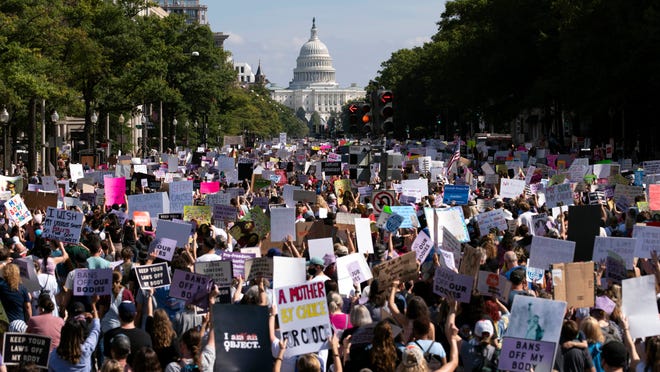
Contact News Now Reporter Christine Fernando at cfernando@usatoday.com or follow her on Twitter at @christinetfern.
Contributing: Austin Miller, The Ocala Star-Banner; Laura Nwogu, Savannah Morning News; Rashika Jaipuriar, Indianapolis Star
WOMENS MARCH
Watch Live: Women's March Returns to DC to Rally for Abortion Rights
The Women’s March Rally for Abortion Justice is set for Saturday in Washington, D.C. and an anti-abortion rights group has planed a counterdemonstration.
By Sophia Barnes, NBC Washington Staff and Associated Press
In Photos: Women's March in DC Rallies for Abortion Rights
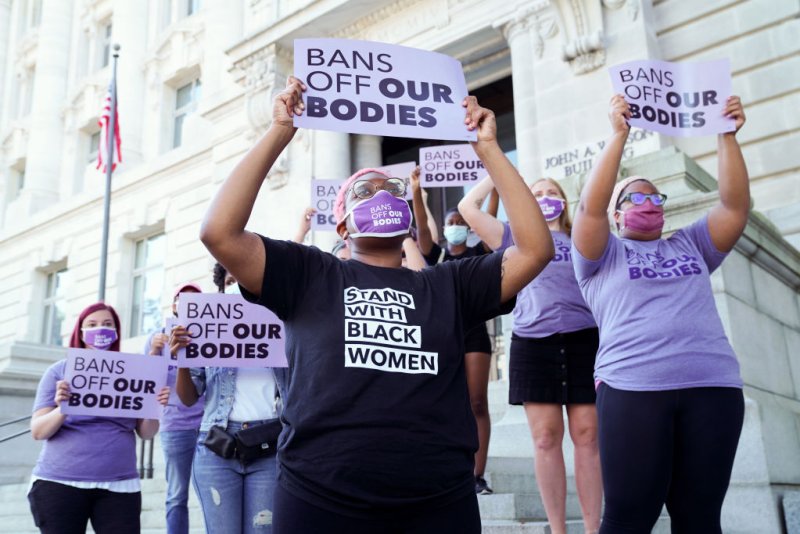
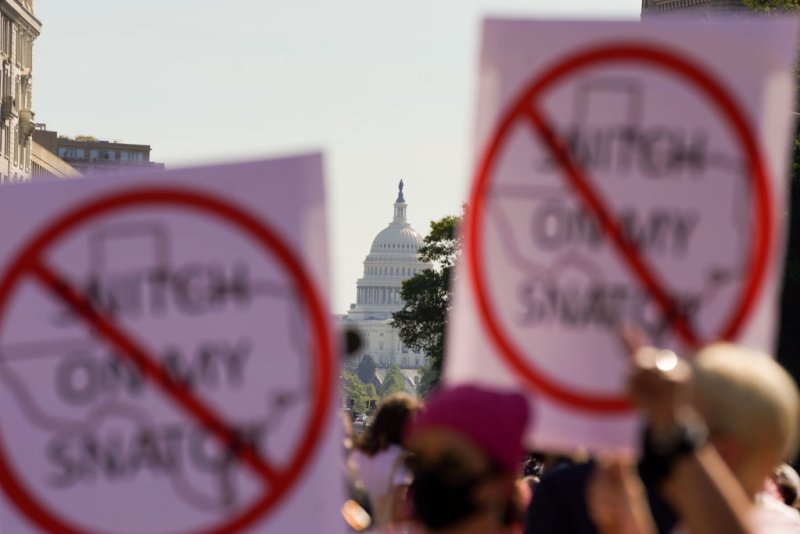
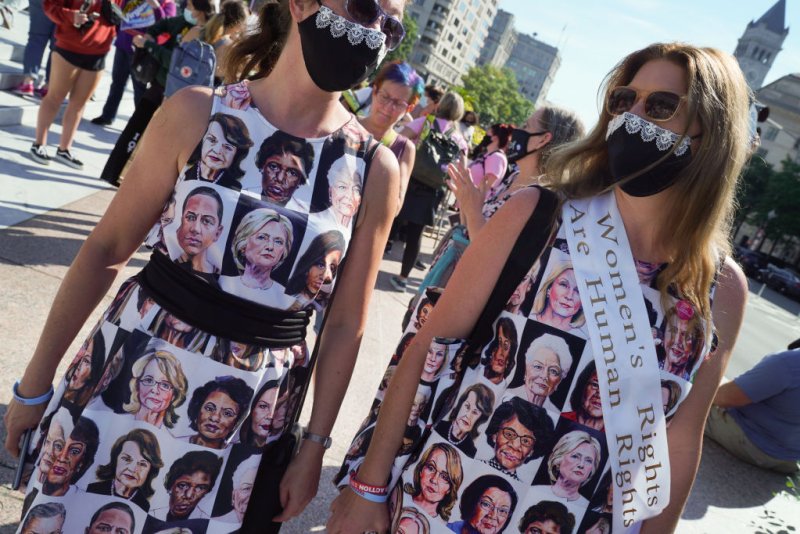
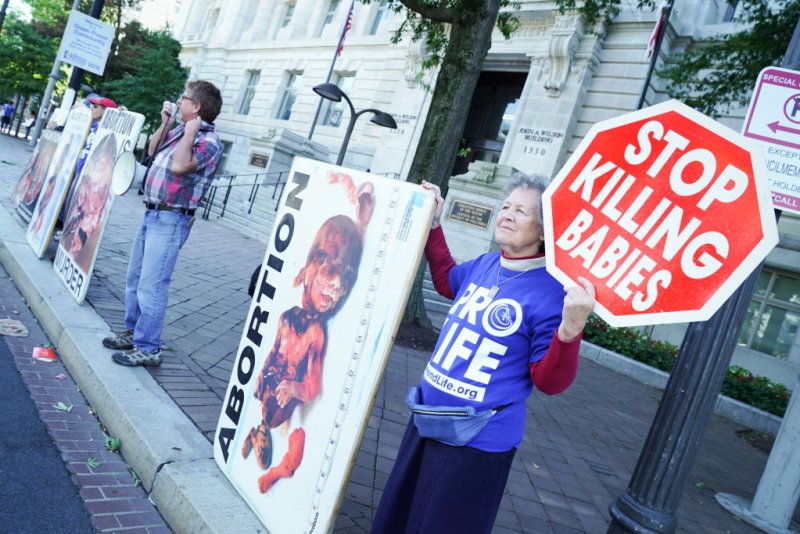
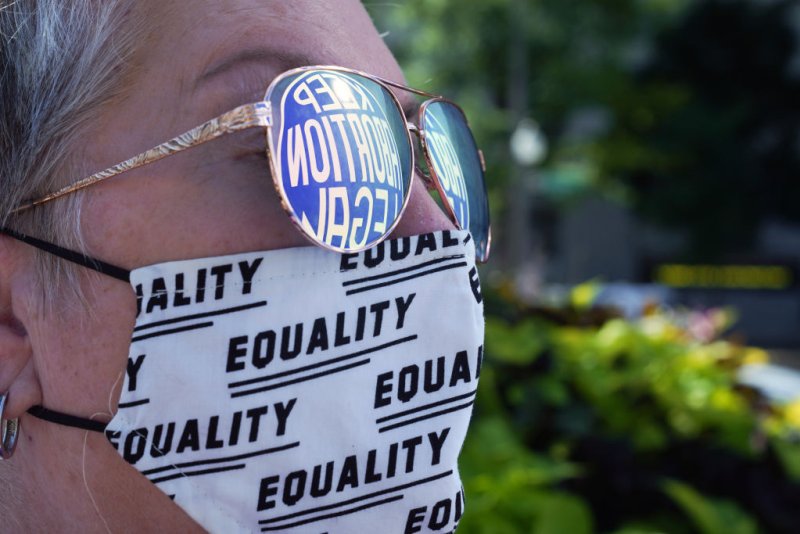
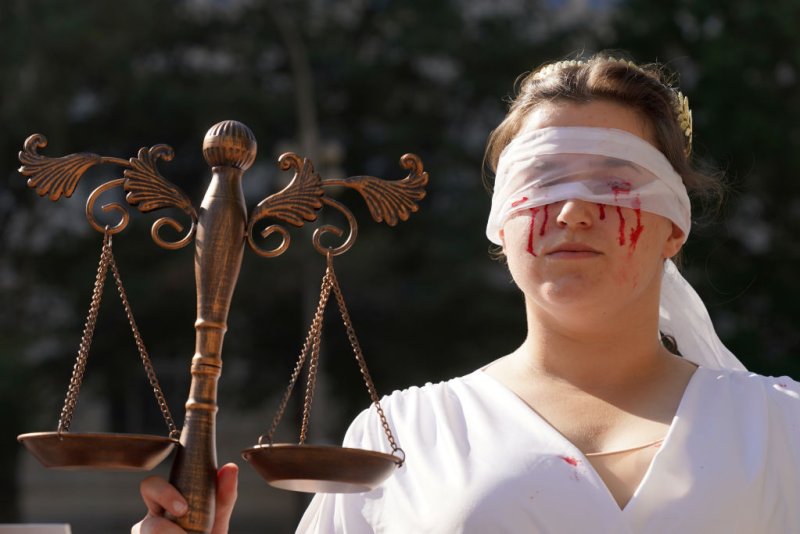
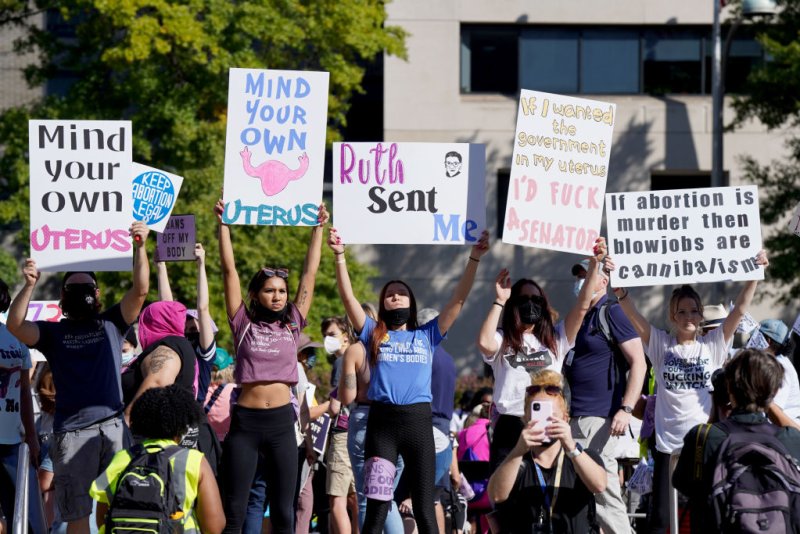
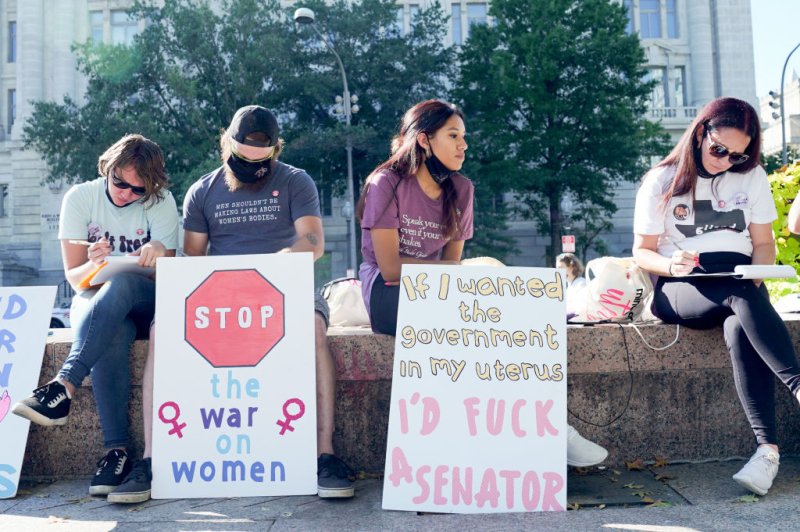
Watch Live: Women's March Returns to DC to Rally for Abortion Rights
The Women’s March Rally for Abortion Justice is set for Saturday in Washington, D.C. and an anti-abortion rights group has planed a counterdemonstration.
By Sophia Barnes, NBC Washington Staff and Associated Press
• Published 2 hours ago • Updated 32 mins ago
The Women’s March in Washington, D.C., on Saturday, is set to rally crowds of demonstrators in support of abortion rights and against a Texas law that bans most abortions.
Streams of protesters, many carrying signs reading "bans off our bodies," converged at Freedom Plaza for a rally before a planned march to the Supreme Court building. Up to 100,000 people are expected to attend rallies in the District and across the country, the Women’s March said
Numerous demonstrators paid homage to former Supreme Court Justice Ruth Bader Ginsburg, highlighting the movement's current effort pressuring the courts to uphold abortion rights.
The Women’s March in Washington, D.C., on Saturday, is set to rally crowds of demonstrators in support of abortion rights and against a Texas law that bans most abortions.
Streams of protesters, many carrying signs reading "bans off our bodies," converged at Freedom Plaza for a rally before a planned march to the Supreme Court building. Up to 100,000 people are expected to attend rallies in the District and across the country, the Women’s March said
Numerous demonstrators paid homage to former Supreme Court Justice Ruth Bader Ginsburg, highlighting the movement's current effort pressuring the courts to uphold abortion rights.
The march is part of “a fight to secure, safeguard, and strengthen our constitutional right to an abortion,” Rachel O'Leary Carmona, executive director of the Women's March, said in a statement. “And it’s a fight against the Supreme Court justices, state lawmakers, and senators who aren’t on our side — or aren’t acting with the urgency this moment demands.”
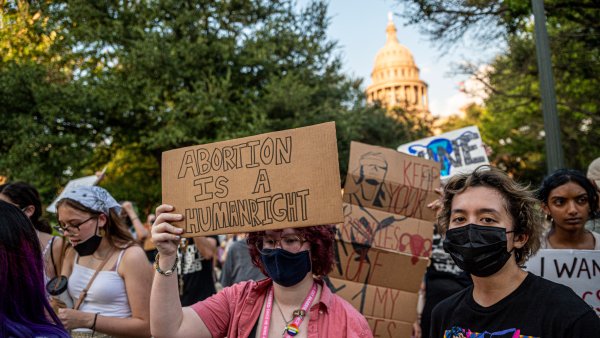
TEXAS ABORTION LAW12 HOURS AGO
Justice Department Urges Judge to Halt Texas Abortion Law
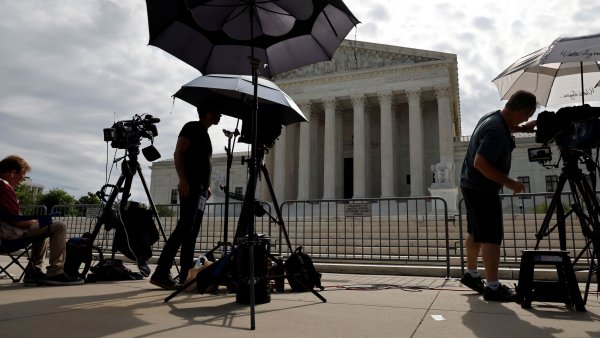
Guns, God and Abortion Are on the Supreme Court's Docket This Term: Here's a Preview of What to Expect
This year, the demonstration is dubbed the Rally for Abortion Justice. Organizers planned this march for early October because the Supreme Court of the United States is set to reconvene on Monday, and a key abortion case is on their docket.
The march comes a day after the Biden administration urged a federal judge to block the nation’s most restrictive abortion law, which has banned most abortions in Texas since early September.
It's one of a series of cases that will give the nation's divided high court occasion to uphold or overrule the landmark Roe v. Wade decision from 1973, which made abortion legal for generations of American women.

TEXAS ABORTION LAW12 HOURS AGO
Justice Department Urges Judge to Halt Texas Abortion Law

Guns, God and Abortion Are on the Supreme Court's Docket This Term: Here's a Preview of What to Expect
This year, the demonstration is dubbed the Rally for Abortion Justice. Organizers planned this march for early October because the Supreme Court of the United States is set to reconvene on Monday, and a key abortion case is on their docket.
The march comes a day after the Biden administration urged a federal judge to block the nation’s most restrictive abortion law, which has banned most abortions in Texas since early September.
It's one of a series of cases that will give the nation's divided high court occasion to uphold or overrule the landmark Roe v. Wade decision from 1973, which made abortion legal for generations of American women.
WASHINGTON, DC – OCTOBER 02: Protesters attend the Rally For Abortion Justice on October 02, 2021 in Washington, DC. (Photo by Leigh Vogel/Getty Images for Women’s March)
An opponent of women's access to abortion called this year's march theme “macabre.”
“What about equal rights for unborn women?” tweeted Jeanne Mancini, president of an anti-abortion group called March for Life.
Anti-abortion rights group Students for Life of America has planned a counter-demonstration across the street from the Women's March in D.C.
The Women's March has become a regular event — although interrupted by the coronavirus pandemic — since millions of women turned out in the United States and around the world the day after the January 2017 inauguration of Trump. Trump endorsed punishing women for getting abortions and made the appointment of conservative judges a mission of his presidency.
Without Trump as a central figure for women of varied political beliefs to rally against, and with the pandemic still going strong, organizers talk of hundreds of thousands of participants nationally Saturday, not the millions of 2017.
In a medication abortion, a pregnant person can end their pregnancy by taking mifepristone and misoprostol pills after medical consultation. Danielle Campoamor explains how the drugs work and how to check if they are legal in your state.
Latina comedian and activist Cristela Alonzo will host the rally in the capital, which will feature speakers from Planned Parenthood and other advocates and providers of abortion access. Actress Busy Philipps and swimmer Schuyler Bailar are due to take part.
Groups that planned to attend include the National Organization of Women (NOW) and Texas pro-abortion rights coalition Trust Respect Access.
Attendees are asked to follow COVID-19 protocols, including wearing masks and social distancing.
An opponent of women's access to abortion called this year's march theme “macabre.”
“What about equal rights for unborn women?” tweeted Jeanne Mancini, president of an anti-abortion group called March for Life.
Anti-abortion rights group Students for Life of America has planned a counter-demonstration across the street from the Women's March in D.C.
The Women's March has become a regular event — although interrupted by the coronavirus pandemic — since millions of women turned out in the United States and around the world the day after the January 2017 inauguration of Trump. Trump endorsed punishing women for getting abortions and made the appointment of conservative judges a mission of his presidency.
Without Trump as a central figure for women of varied political beliefs to rally against, and with the pandemic still going strong, organizers talk of hundreds of thousands of participants nationally Saturday, not the millions of 2017.
In a medication abortion, a pregnant person can end their pregnancy by taking mifepristone and misoprostol pills after medical consultation. Danielle Campoamor explains how the drugs work and how to check if they are legal in your state.
Latina comedian and activist Cristela Alonzo will host the rally in the capital, which will feature speakers from Planned Parenthood and other advocates and providers of abortion access. Actress Busy Philipps and swimmer Schuyler Bailar are due to take part.
Groups that planned to attend include the National Organization of Women (NOW) and Texas pro-abortion rights coalition Trust Respect Access.
Attendees are asked to follow COVID-19 protocols, including wearing masks and social distancing.
In Photos: Women's March in DC Rallies for Abortion Rights








Thousands of women march in Southern California as abortion-rights showdowns loom
In Southern California, the largest protest is in Los Angeles, a gathering that has typically drawn thousands of people. But demonstrations are planned throughout the region, from Orange County to the Inland Empire, from Redondo Beach to the San Gabriel Valley.
 Demonstrators gather at the Los Angeles Women’s March from Pershing Square to City Hall on Saturday, October 17, 2020. (Photo by Keith Birmingham, Pasadena Star-News/ SCNG)
Demonstrators gather at the Los Angeles Women’s March from Pershing Square to City Hall on Saturday, October 17, 2020. (Photo by Keith Birmingham, Pasadena Star-News/ SCNG)
By RYAN CARTER | rcarter@scng.com, BRENNON DIXSON | bdixson@scng.com, HUNTER LEE | hlee@scng.com and PIERCE SINGGIH | psinggih@scng.com | Daily News
PUBLISHED: October 2, 2021 at 7:59 a.m. | UPDATED: October 2, 2021 at 9:15 a.m.
Myriad “sister marches,” spinoffs of the fifth annual Women’s March in Washington D.C. today, were expected to fill the streets of Southern California. At least 600 marches are planned around the nation.
Local protesters joined activists across the nation, aiming to decry a restrictive Texas abortion law and draw attention to an upcoming U.S. Supreme Court decision on Mississippi’s abortion laws — a case that pro choice advocates fear could overturn Roe v. Wade.
The marches trace their roots to protests that arose after President Donald Trump’s election, but these will be the first since he left office. During his tenure, key Supreme Court appointments shifted the court into a conservative direction and the table for abortion-rights showdowns in years to come.
In Southern California, the largest protest is planned in Los Angeles, a gathering that has typically drawn thousands of people. But demonstrations are planned throughout the region, from Orange County to the Inland Empire, from Redondo Beach to the San Gabriel Valley.
Demonstrations were expected in Riverside, Temecula, Redlands Pasadena, Beverly Hills, Long Beach, Malibu, North Hollywood, Redondo Beach, San Pedro, Simi Valley, Westchester and West Hollywood. And there are more: map.womensmarch.com/.
Some of these rallies were planned by larger women’s or political groups, but others are more grassroots, including those planned by individuals who say they feel a responsibility to protect the futures of young women and teach them about the importance of reproductive rights.
“Abortion care is a critical component of healthcare. It needs to be equitable and accessible for everyone regardless of their socioeconomic status,” said state Sen. Lena Gonzales, who was expected to participate in the Long Beach event. Her district encompasses parts of Long Beach and the South Bay. “California has been a leader in reproductive freedom and we will continue fighting these national attacks that threaten the quality of life for so many in our state and country.”
“This is not just for us. It’s for our children and our children’s children,” Emiliana Guereca, president of the Women’s March Foundation, said in an emailed statement. “It’s beyond time for the United States to recognize that access to abortion care is a key part of access to human rights.”
Opponents of legal abortions have won significant victories in court and in houses of government in recent months.
A recent Texas law banned abortions after six weeks, which is when healthcare providers can detect a fetal heartbeat but before most women know that they’re pregnant. It has been described as the strictest abortion law since the Supreme Court’s decision on Roe v. Wade in 1973, and it provides no exceptions for victims of rape or incest.
The law also allows state residents to sue medical clinics, doctors, nurses and people who drive women to get an abortion for damages of up to $10,000. The Supreme Court voted 5-4 to keep the law in place, though the reasoning from the majority was one of standing.
And in December, the conservative-leaning Supreme Court will hear arguments from Mississippi lawmakers who want to ban abortions in that state after 15 weeks.
In Los Angeles, a collection of Downtown streets were scheduled to be closed for the march, which was set to wind from Pershing Square and concluding with a rally at City Hall.
Participants planned to gather at 9 a.m. at Pershing Square, 532 S. Olive St., with the march at 10 a.m. to City Hall, 200 N. Spring St. Organizers, including Women’s March Foundation, will hold a program with guest speakers, 11 a.m.-2 p.m.
The Los Angeles Department of Transportation announced these street closures in the area:
From 9 a.m. to 2 p.m.
Olive and Hill streets between First and Fifth streets
First Street between Hill and Spring streets
From 2 to 8 p.m.
Spring Street between First and Temple streets
The LADOT adds that if the crowd reaches into the thousands, there may be more impacted streets that will require closures. For updates, LADOT’s Facebook, www.facebook.com/ladotofficial. Website: bit.ly/3F6Fzu2.
In Southern California, the largest protest is in Los Angeles, a gathering that has typically drawn thousands of people. But demonstrations are planned throughout the region, from Orange County to the Inland Empire, from Redondo Beach to the San Gabriel Valley.
 Demonstrators gather at the Los Angeles Women’s March from Pershing Square to City Hall on Saturday, October 17, 2020. (Photo by Keith Birmingham, Pasadena Star-News/ SCNG)
Demonstrators gather at the Los Angeles Women’s March from Pershing Square to City Hall on Saturday, October 17, 2020. (Photo by Keith Birmingham, Pasadena Star-News/ SCNG)By RYAN CARTER | rcarter@scng.com, BRENNON DIXSON | bdixson@scng.com, HUNTER LEE | hlee@scng.com and PIERCE SINGGIH | psinggih@scng.com | Daily News
PUBLISHED: October 2, 2021 at 7:59 a.m. | UPDATED: October 2, 2021 at 9:15 a.m.
Myriad “sister marches,” spinoffs of the fifth annual Women’s March in Washington D.C. today, were expected to fill the streets of Southern California. At least 600 marches are planned around the nation.
Local protesters joined activists across the nation, aiming to decry a restrictive Texas abortion law and draw attention to an upcoming U.S. Supreme Court decision on Mississippi’s abortion laws — a case that pro choice advocates fear could overturn Roe v. Wade.
The marches trace their roots to protests that arose after President Donald Trump’s election, but these will be the first since he left office. During his tenure, key Supreme Court appointments shifted the court into a conservative direction and the table for abortion-rights showdowns in years to come.
In Southern California, the largest protest is planned in Los Angeles, a gathering that has typically drawn thousands of people. But demonstrations are planned throughout the region, from Orange County to the Inland Empire, from Redondo Beach to the San Gabriel Valley.
Demonstrations were expected in Riverside, Temecula, Redlands Pasadena, Beverly Hills, Long Beach, Malibu, North Hollywood, Redondo Beach, San Pedro, Simi Valley, Westchester and West Hollywood. And there are more: map.womensmarch.com/.
Some of these rallies were planned by larger women’s or political groups, but others are more grassroots, including those planned by individuals who say they feel a responsibility to protect the futures of young women and teach them about the importance of reproductive rights.
“Abortion care is a critical component of healthcare. It needs to be equitable and accessible for everyone regardless of their socioeconomic status,” said state Sen. Lena Gonzales, who was expected to participate in the Long Beach event. Her district encompasses parts of Long Beach and the South Bay. “California has been a leader in reproductive freedom and we will continue fighting these national attacks that threaten the quality of life for so many in our state and country.”
“This is not just for us. It’s for our children and our children’s children,” Emiliana Guereca, president of the Women’s March Foundation, said in an emailed statement. “It’s beyond time for the United States to recognize that access to abortion care is a key part of access to human rights.”
Opponents of legal abortions have won significant victories in court and in houses of government in recent months.
A recent Texas law banned abortions after six weeks, which is when healthcare providers can detect a fetal heartbeat but before most women know that they’re pregnant. It has been described as the strictest abortion law since the Supreme Court’s decision on Roe v. Wade in 1973, and it provides no exceptions for victims of rape or incest.
The law also allows state residents to sue medical clinics, doctors, nurses and people who drive women to get an abortion for damages of up to $10,000. The Supreme Court voted 5-4 to keep the law in place, though the reasoning from the majority was one of standing.
And in December, the conservative-leaning Supreme Court will hear arguments from Mississippi lawmakers who want to ban abortions in that state after 15 weeks.
In Los Angeles, a collection of Downtown streets were scheduled to be closed for the march, which was set to wind from Pershing Square and concluding with a rally at City Hall.
Participants planned to gather at 9 a.m. at Pershing Square, 532 S. Olive St., with the march at 10 a.m. to City Hall, 200 N. Spring St. Organizers, including Women’s March Foundation, will hold a program with guest speakers, 11 a.m.-2 p.m.
The Los Angeles Department of Transportation announced these street closures in the area:
From 9 a.m. to 2 p.m.
Olive and Hill streets between First and Fifth streets
First Street between Hill and Spring streets
From 2 to 8 p.m.
Spring Street between First and Temple streets
The LADOT adds that if the crowd reaches into the thousands, there may be more impacted streets that will require closures. For updates, LADOT’s Facebook, www.facebook.com/ladotofficial. Website: bit.ly/3F6Fzu2.
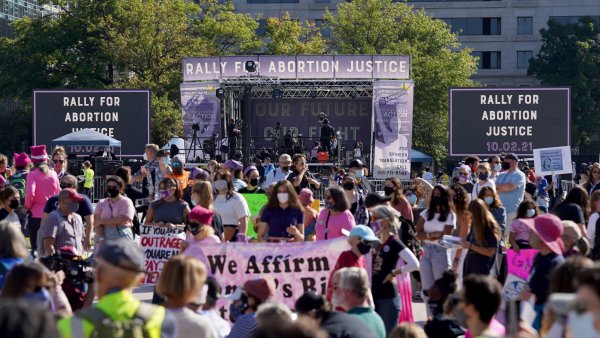
No comments:
Post a Comment